Posted December 19, 2016 by Nicky in Reviews / 2 Comments
 This Is Your Brain on Music, Daniel Levitin
This Is Your Brain on Music, Daniel Levitin
Despite loving singing, and having been good enough to perform and not have people run away, I know very little about music. Not that Levitin would be a snob about that, from the sound of this book, but it still forms a bit of a barrier to understanding when someone starts talking about semitones. I can sing C on demand, and I know when something is out of tune — what more do you want? (Although unlike most people, I have a bad sense of timing, apparently: I routinely sing slower than the original version of anything I’m performing. Most people apparently preserve the timing of the version they know best. Trivia!)
So anyway, the music side of this passed me by, mostly, despite the primer in the opening chapters. But the neuroscience behind music is fascinating, and Levitin explains it well. There are a few sections which drag as he spends too long explaining things, but on the other hand he references a wide selection of music, applying what he’s talking about to songs people often know. (Which again led me to wishing I knew more music, but this time popular music — I think I got one out of every five references? And my acquaintance with Bowie is pretty darn recent.)
I feel like the best people to appreciate this have a bit more music theory and a bit less neuroscience in their background, but nonetheless, I found it an intriguing read.
Rating: 3/5
Tags: book reviews, books, non-fiction, science
Posted December 18, 2016 by Nicky in Reviews / 0 Comments
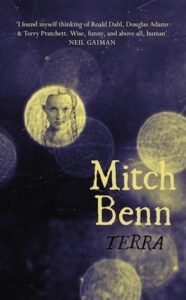 Terra, Mitch Benn
Terra, Mitch Benn
This was the perfect read for me at the point when I got hold of it. It’s funny, sometimes silly, but it also has a lot of heart. It’s sceptical about humanity and the way we behave, but hopeful too. There’s all kinds of fun glimpses at the alien culture Terra becomes part of, with its different norms and expectations. And goodness knows, if my dad weren’t pretty awesome and probably a space alien anyway, I’d want Lbbp to be my father-figure.
It’s relatively simplistic and light, written more for a young adult audience, but it was exactly what I needed at the moment I read it. It’s well written, well paced, and has a refreshingly nice take on human (and alien) nature.
I don’t know what to say about it, except that I found it a delight, and my wife had better read it soon.
Rating: 4/5
Tags: book reviews, books, SF/F
Posted December 17, 2016 by Nicky in Reviews / 4 Comments
 Cleopatra: Last Queen of Egypt, Joyce Tyldesley
Cleopatra: Last Queen of Egypt, Joyce Tyldesley
This book is a solid biography of Cleopatra, appreciating her cleverness and ability as a politician, and examining how the world at the time reacted to her. It’s perhaps a little drier than people would hope — how could you make Cleopatra so academic, when she’s such a colourful figure? Well, I don’t mind that at all, and I enjoyed the way it contextualised her achievements and dissected the myths surrounding her. It delves into the background of her rule and her city, as well, giving a picture of Egypt under the Ptolemies.
I’ve enjoyed other books by Tyldesley before, and though it’s not one of my areas of expertise, I have found her books well-written, referenced and clear. That’s more than I can say for some other Egyptologists who write for the pop-history crowd. Other than that, I don’t have much basis to make a judgement, but I found this one enjoyable.
Rating: 4/5
Tags: book reviews, books, history, non-fiction
Posted December 16, 2016 by Nicky in Reviews / 0 Comments
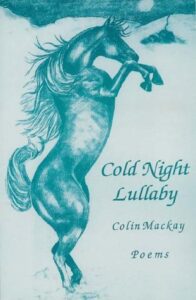 Cold Night Lullaby, Colin MacKay
Cold Night Lullaby, Colin MacKay
Flashback Friday from 25th December, 2009
I asked for Colin Mackay’s Cold Night Lullaby for Christmas 2009 because of Karine Polwart’s song, ‘Waterlily’. It’s a beautiful song, and one that has been known to make me cry — based on Colin Mackay’s writing about his experiences in Bosnia, about the woman he loved, Svetlana. I couldn’t tell you about the really technical merits of the poetry right now, but the images are so vivid, searing. I doubt I can ever, ever listen to ‘Waterlily’ again without crying. Especially when I know what Colin Mackay went on to do — how he killed himself, so very, very methodically.
Reading around a little, I can see that there are some questions about geography/chronology in these poems. I wouldn’t be surprised by some fictionality, or inaccuracy due to how confusing and bewildering living through something like that can be, how destroying, but I think that Colin Mackay probably believed every word he wrote — and that’s what matters.
Rating: 5/5
Tags: book reviews, books, Flashback Friday, poetry
Posted December 15, 2016 by Nicky in Reviews / 0 Comments
 Moon Tiger, Penelope Lively
Moon Tiger, Penelope Lively
I don’t know why I originally picked this up: it’s the sort of consciously literary creation that doesn’t normally work for me, and so proved to be the case this time too. The meandering, disconnected narration might’ve been clever, I suppose, but to me, it just got in the way of the story. And the story… well, nothing special as far as my tastes go; full of characters I didn’t really like or root for. Pretty much my nightmare as far as a book goes.
The writing itself is pretty, at times, evocative, though sometimes too consciously so.
Chalk it up to ‘not for me’ and move on…
Rating: 1/5
Tags: book reviews, books
Posted December 14, 2016 by Nicky in Reviews / 0 Comments
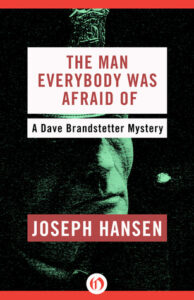 The Man Everybody Was Afraid Of, Joseph Hansen
The Man Everybody Was Afraid Of, Joseph Hansen
This is one of those mysteries where you can’t root for the mystery to be solved for the sake of the victim, a man who was a bully, a racist, and thoroughly unpleasant in almost all his interactions. Instead, the characters surrounding them need to get their hooks into you, and in this case that didn’t really work for me. Much more central was Dave’s sadness over his father’s illness, his disconnection with Doug, and the connection he does form with Cecil — one that rather surprises a reader familiar with Dave, who doesn’t seem like the type to be very appreciative of cheating, and yet does so himself.
It gets a little bit too convoluted in solving the mystery, in order to bring in a bunch of red herrings and implicate several different characters. That made it frustrating, and not quite as smooth a read for me as the earlier books. It’s still enjoyable, but not a favourite.
Rating: 3/5
Tags: book reviews, books, crime, Joseph Hansen, mystery, queer fic
Posted December 13, 2016 by Nicky in Reviews / 0 Comments
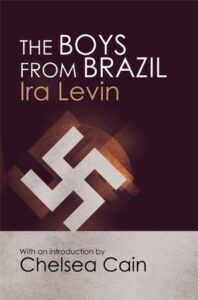 The Boys from Brazil, Ira Levin
The Boys from Brazil, Ira Levin
The Boys from Brazil is a bit of a classic; I actually remember my Religious Studies teacher telling us the basic plot and asking us about the moral issues at the centre. So for quite a while, I’ve been very interested to read it. It’s a bit odd to read, because it’s written with a sort of affect-less style: ‘the man did this and then the man did that, and turned to the blond man and said…’ I mean, here’s an actual example of the style:
“The blond man, panting, stopped stabbing, and the black-haired man lowered the surprised-eyed young man gently to the floor, laid him down there half on the gray rug and half on varnished wood. The blond man held his bloody knife-hand over the young man and said to the black-haired man, ‘A towel.'”
Aaargghh.
The actual plot and the thriller aspect is interesting, and the moral dilemma is perhaps more relevant/possible now than it was when the book was written, but I do think it’s dated badly and the writing style does it no favours.
Rating: 2/5
Tags: book reviews, books, SF/F
Posted December 12, 2016 by Nicky in Reviews / 4 Comments
 Emma, Jane Austen
Emma, Jane Austen
I came very late to an appreciation of Austen’s work — via a copy of Northanger Abbey some previous student had annotated with rather astute observations, actually. Emma is definitely not my favourite of Austen’s works; it seems to drag, and the whole situation is just embarrassing, with Emma being so stuck up and arrogant, but so naive. I’m not honestly sure why the character she marries in the end actually loves her, since he is a man of taste and discernment. Sure, she realises she’s been an idiot, but I’m not entirely sure she realises why and how not to do it again.
Since I get really bad second-hand embarrassment, then, it’s perhaps not surprising that Emma isn’t my favourite Austen, nor Emma my favourite of her heroines. Austen’s writing is still witty, her eye for character and the ridiculousness of people exacting, but… I just don’t like it. I’m glad I’ve now read it, but I wouldn’t read it again, and I recall enjoying Austen’s other novels rather more than this one, which felt like a chore.
There, Mum, are you happy I’m not a cuckoo in your nest now?
Rating: 2/5
Tags: book reviews, books, classics
Posted December 11, 2016 by Nicky in Reviews / 0 Comments
 Gut: The Inside Story of our Body’s Most Underrated Organ, Giulia Enders
Gut: The Inside Story of our Body’s Most Underrated Organ, Giulia Enders
Gut is a fun light read; it’s not in-depth or academic at all — it doesn’t even have an index! — but it is fun and informative for a layperson. There’s no technical stuff here that isn’t explained, and there’s a fairly light tone to all of it, sometimes quite irreverent. Sometimes, however, you can’t really say it’s irreverent because it’s full of an enthusiasm and awe for our digestive system and everything it can do.
My main quibble was that it was too casual, too light, too much for the layperson. This wouldn’t be my chosen field even if I wanted to, but with just a couple of other books covering similar topics under my belt, a lot of it was just boring. (For example, for stuff on microbes, go for Missing Microbes by Martin Blaser, instead. Much more informative and in-depth, albeit not so easy a read.)
It’s fun, and it probably works well for the intended audience; I’m just not that audience, really. I did learn some interesting facts, and the diagrams/illustrations are pretty fun.
Rating: 3/5
Tags: book reviews, books, non-fiction
Posted December 10, 2016 by Nicky in Reviews / 0 Comments
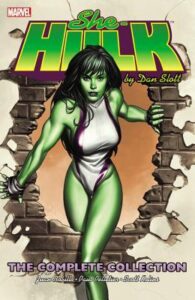 She-Hulk: The Complete Collection Vol 1, Dan Slott, Juan Bobillo, Paul Pelletier, Scott Kolins
She-Hulk: The Complete Collection Vol 1, Dan Slott, Juan Bobillo, Paul Pelletier, Scott Kolins
It took me a while to get round to reading this, especially since the opening few pages feature what read very much like shaming Jennifer/She-Hulk for her sexuality. It makes some sense — she is partying hard and putting the other Avengers at risk (or at the very least inconveniencing them), and taking her status as an Avenger for granted. It also leads into a whole thread about her double identity, and what might be the advantage of being Jennifer Walters. (For those who don’t know, unlike her cousin, Bruce Banner, she has more control over her transformations, and spends a lot of time as She-Hulk.)
There’s also some wacky hijinks and fun plots involving law, since Jennifer Walters is a lawyer. I liked the art and colours, too, so I’m somewhat surprised now to be writing the review and not knowing quite what to say. It’s entertaining, and I enjoyed this version of the character, but I did start to feel like maybe it needed some fresh blood — and this is only the first collection! There’s another Dan Slott collection as well. Hmmm…
I asked for volume two for Christmas, so here’s hoping it stays lively and fun.
Rating: 3/5
Tags: book reviews, books, comics, Marvel
 This Is Your Brain on Music, Daniel Levitin
This Is Your Brain on Music, Daniel Levitin








